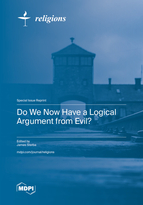Do We Now Have a Logical Argument from Evil?
A special issue of Religions (ISSN 2077-1444). This special issue belongs to the section "Religions and Humanities/Philosophies".
Deadline for manuscript submissions: closed (30 September 2022) | Viewed by 55041
Special Issue Editor
Interests: moral and political philosophy; philosophy of religion
Special Issues, Collections and Topics in MDPI journals
Special Issue Information
Dear Colleagues,
Since the early 1970s, atheists and theists have both tended to reject the logical argument from evil because they thought that Alvin Plantinga had shown against John Mackie that the God of traditional theism was at least logically compatible with some evil in the world. However, in 2019, I published Is a Good God Logically Possible? (Palgrave paperback), in which I argued that the all-good, all-powerful God of traditional theism is logically incompatible with ALL the evil in the world. There followed an author-meets-critics session on the book with afterthoughts all published in the International Journal for Philosophy of Religion, a number of public presentations, and a debate at Princeton University. Most recently, there were sixteen contributors to a Special Issue of Religions on the topic of my book, and I was able to respond to all of them in that same issue.
In my judgment, these various defenses of my logical argument from evil have, so far, been successful. My argument has succeeded because, as a logical argument from evil, it relies on some necessary premises and it has a way of taking into account all the goods with which the God of traditional theism, if he exists, could provide us. Hence, the question that this Special Issue addresses to atheists and theists alike is appropriate. There really is no more important question today in the philosophy of religion.
Prof. Dr. James SterbaGuest Editor
Manuscript Submission Information
Manuscripts should be submitted online at www.mdpi.com by registering and logging in to this website. Once you are registered, click here to go to the submission form. Manuscripts can be submitted until the deadline. All submissions that pass pre-check are peer-reviewed. Accepted papers will be published continuously in the journal (as soon as accepted) and will be listed together on the special issue website. Research articles, review articles as well as short communications are invited. For planned papers, a title and short abstract (about 100 words) can be sent to the Editorial Office for announcement on this website.
Submitted manuscripts should not have been published previously, nor be under consideration for publication elsewhere (except conference proceedings papers). All manuscripts are thoroughly refereed through a double-blind peer-review process. A guide for authors and other relevant information for submission of manuscripts is available on the Instructions for Authors page. Religions is an international peer-reviewed open access monthly journal published by MDPI.
Please visit the Instructions for Authors page before submitting a manuscript. The Article Processing Charge (APC) for publication in this open access journal is 1800 CHF (Swiss Francs). Submitted papers should be well formatted and use good English. Authors may use MDPI's English editing service prior to publication or during author revisions.
Keywords
- Alvin Plantinga
- John Mackie
- God of traditional theism
- logical argument from evil
- evidential or probabilistic argument from evil
- free will defense
- Pauline principle
- skeptical theism
- superheroes
- an ideally just and powerful political state






